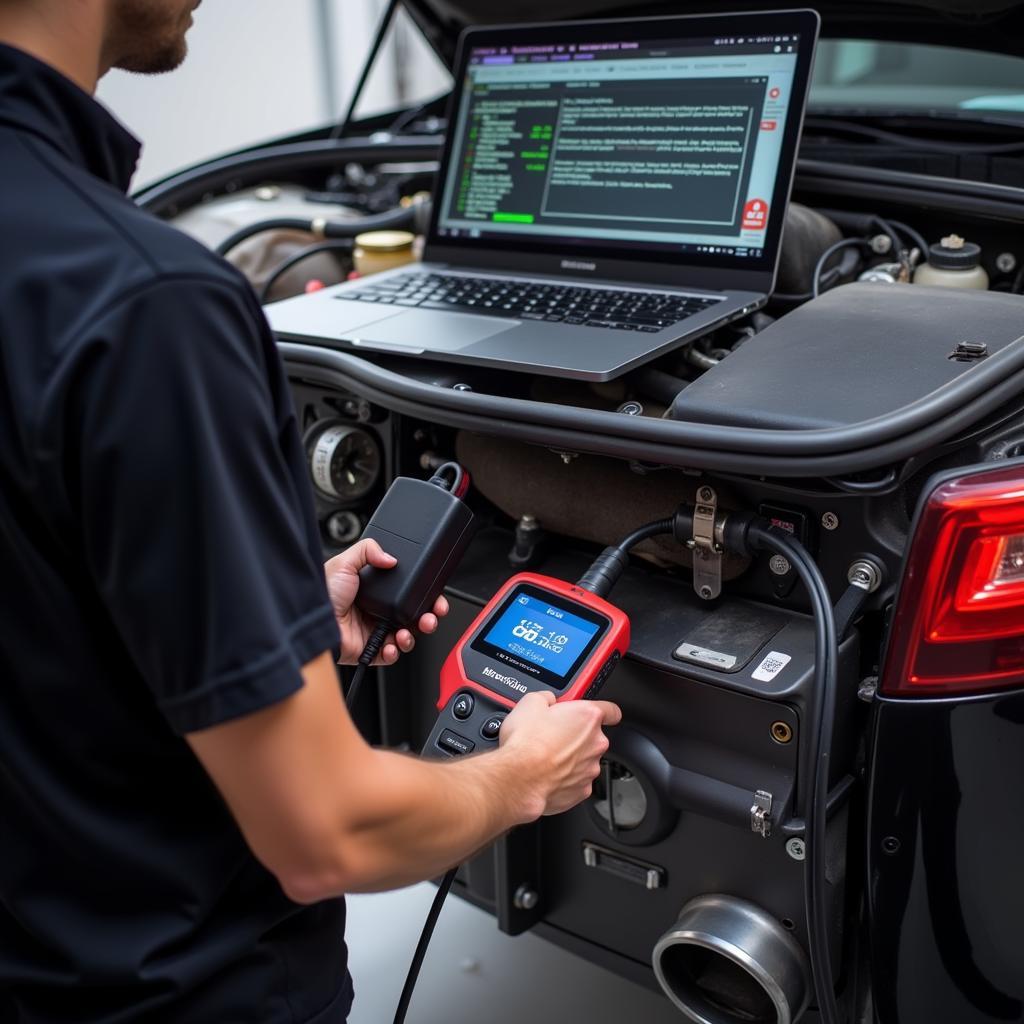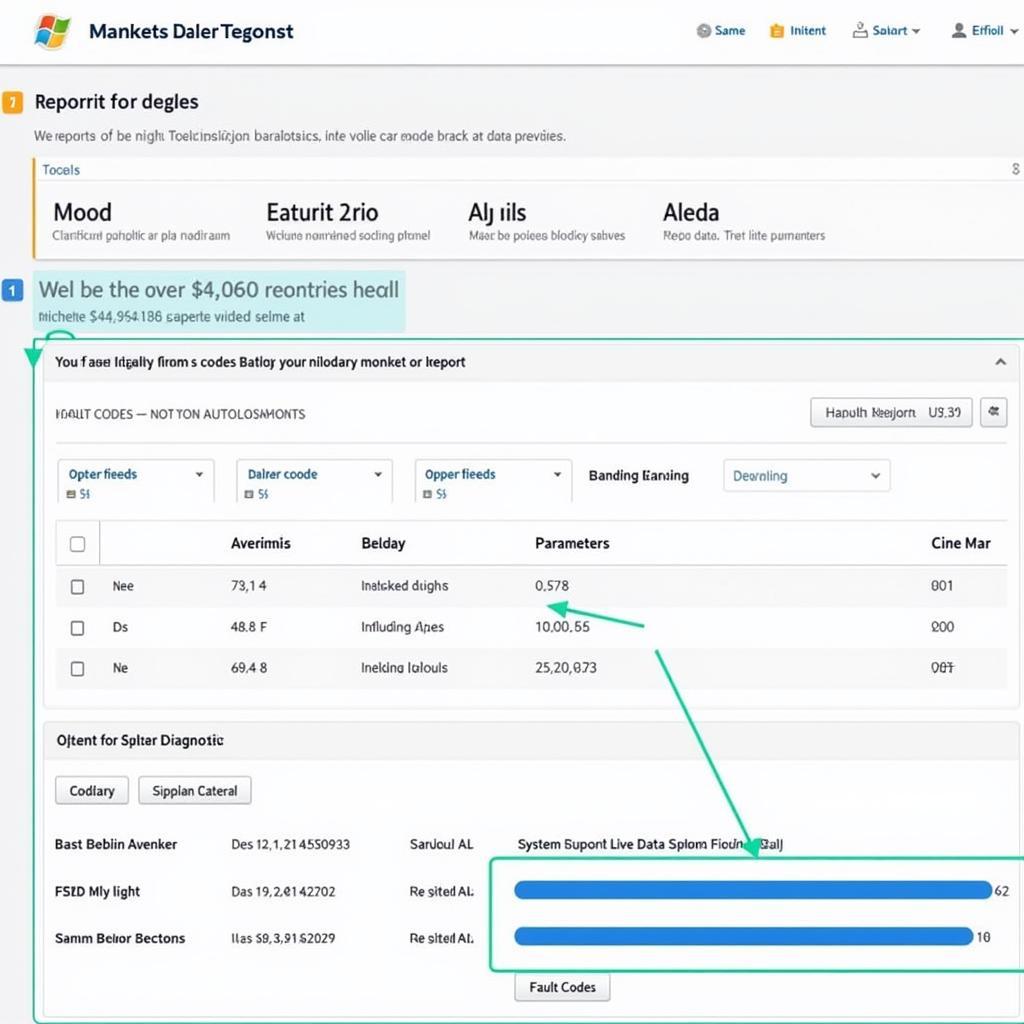Full Car Diagnostics are essential for maintaining your vehicle’s health, performance, and longevity. As cars become increasingly complex, traditional methods of troubleshooting often fall short. With full car diagnostics, mechanics and car owners alike can access detailed insights into the inner workings of their vehicles.
What Does Full Car Diagnostics Mean?
“Full car diagnostics” refers to a comprehensive analysis of your vehicle’s electronic systems using specialized software and hardware. This goes beyond simply reading and clearing basic trouble codes like a generic OBD-II scanner. Instead, full car diagnostics delve deeper, providing a more accurate and comprehensive understanding of your car’s status.
 Full Car Diagnostic Process
Full Car Diagnostic Process
Why Choose Full Car Diagnostics?
While traditional methods might address immediate symptoms, full car diagnostics go beyond the surface. They help identify the root causes of issues, even those that are yet to manifest as noticeable problems. This proactive approach allows for preventative maintenance, saving you time and money on costly repairs in the long run.
Here’s what sets full car diagnostics apart:
- In-Depth System Coverage: From engine and transmission to ABS, airbags, and even infotainment systems, full car diagnostics can access a wide range of modules and components.
- Accurate Fault Identification: Pinpoint the exact location and nature of faults, eliminating guesswork and unnecessary component replacements.
- Real-time Data Monitoring: Observe live data streams from various sensors, allowing for dynamic analysis and performance evaluation.
- Advanced Troubleshooting Capabilities: Access manufacturer-specific data and perform specialized tests, such as bidirectional control of actuators.
Benefits of Full Car Diagnostics
The advantages of opting for full car diagnostics extend beyond immediate problem-solving. Here are some key benefits:
- Preventative Maintenance: Detect minor issues before they escalate into major problems, reducing the risk of breakdowns and expensive repairs.
- Enhanced Vehicle Performance: Identify and address performance bottlenecks, improving fuel efficiency, engine responsiveness, and overall drivability.
- Increased Safety: Ensure all safety systems, including airbags, ABS, and stability control, are functioning optimally.
- Higher Resale Value: Maintaining a well-documented diagnostic history demonstrates proper vehicle care, making it more appealing to potential buyers.
 Comprehensive Car Diagnostic Report
Comprehensive Car Diagnostic Report
Who Needs Full Car Diagnostics?
Full car diagnostics are beneficial for a range of car owners and professionals:
- Car Owners: Proactive individuals who prioritize preventative maintenance and want a deeper understanding of their vehicle’s health.
- Mechanics: Professionals seeking accurate diagnoses, efficient troubleshooting, and access to manufacturer-specific information.
- Used Car Buyers: Individuals wanting a comprehensive inspection of a potential purchase to ensure its condition and identify any hidden problems.
Choosing the Right Diagnostic Tool
Selecting the appropriate diagnostic tool is crucial for obtaining accurate and comprehensive results. Consider the following factors:
- Vehicle Compatibility: Ensure the tool supports your vehicle’s make, model, and year.
- Functionality: Determine the specific features and capabilities required for your needs, such as live data, bidirectional control, and special functions.
- Software Updates: Choose a tool with regular software updates to ensure compatibility with the latest vehicle models and technologies.
- Ease of Use: Opt for a user-friendly interface with clear navigation and intuitive functionalities.
Common Issues Diagnosed
Full car diagnostics can uncover a wide array of issues, including:
- Engine Problems: Misfires, poor fuel economy, reduced power, and emissions issues.
- Transmission Faults: Slipping gears, harsh shifting, and transmission failure.
- Brake System Malfunctions: ABS problems, brake warning lights, and uneven braking performance.
- Electrical Issues: Battery problems, faulty sensors, wiring faults, and lighting issues.
- Airbag System Faults: Airbag warning lights, faulty sensors, and deployment issues.
Full Car Diagnostics vs. OBD-II Scanners
While OBD-II scanners can read and clear basic diagnostic trouble codes (DTCs), full car diagnostic tools provide a more comprehensive analysis.
- OBD-II Scanners: Primarily focus on engine and emissions-related systems.
- Full Car Diagnostics: Offer broader system coverage, including ABS, airbags, transmission, and more.
diagnostic computer for all cars
The Future of Car Diagnostics
As technology advances, car diagnostics will continue to evolve. We can expect to see:
- Increased Cloud Integration: Wireless connectivity for remote diagnostics, data sharing, and over-the-air software updates.
- Predictive Analytics: Utilizing artificial intelligence and machine learning to predict potential problems before they occur.
- Augmented Reality Integration: Overlaying diagnostic information onto real-world views for enhanced troubleshooting.
Conclusion
Full car diagnostics are crucial for maintaining modern vehicles. By providing a comprehensive understanding of your car’s health, these diagnostics empower car owners and professionals to make informed decisions regarding maintenance and repairs. As technology advances, the capabilities and benefits of full car diagnostics will only continue to grow, ensuring optimal vehicle performance, safety, and longevity.
Frequently Asked Questions
1. How often should I get full car diagnostics?
It’s generally recommended to have your car professionally diagnosed at least once a year or every 12,000 miles, whichever comes first. However, if you notice any unusual behavior or warning lights, it’s best to have it checked immediately.
2. Can I perform full car diagnostics myself?
While DIY diagnostic tools are available, they may not offer the same depth and functionality as professional-grade equipment. Certain procedures may also require specialized knowledge and experience.
3. Are full car diagnostics expensive?
The cost of full car diagnostics can vary depending on factors such as location, the complexity of the diagnosis, and the specific tool used. However, compared to the potential costs of neglecting potential problems, diagnostics can save you money in the long run.
star diagnostic machine how to connect to car
4. Can full car diagnostics fix my car?
While diagnostics identify existing or potential problems, they don’t inherently fix them. The diagnosis provides valuable information that guides mechanics in performing the necessary repairs effectively.
5. What should I do if my car shows no warning lights but still exhibits problems?
Even without warning lights, underlying issues might be present. Full car diagnostics can reveal hidden problems and ensure your car’s overall well-being.
car diagnostic code reader snap-on buy uk
6. How can I ensure the accuracy of my car’s diagnostics?
Choosing a reputable mechanic with experience and using high-quality diagnostic equipment significantly improves the accuracy and reliability of the results.
7. Can full car diagnostics identify software-related issues?
Yes, full car diagnostics can identify software glitches, faulty modules, and other software-related issues that might be affecting your car’s performance.
If you need any further assistance or have car diagnostic-related questions, don’t hesitate to contact us via WhatsApp at +1(641)206-8880 or email us at [email protected]. Our dedicated customer support team is available 24/7 to assist you.

Leave a Reply